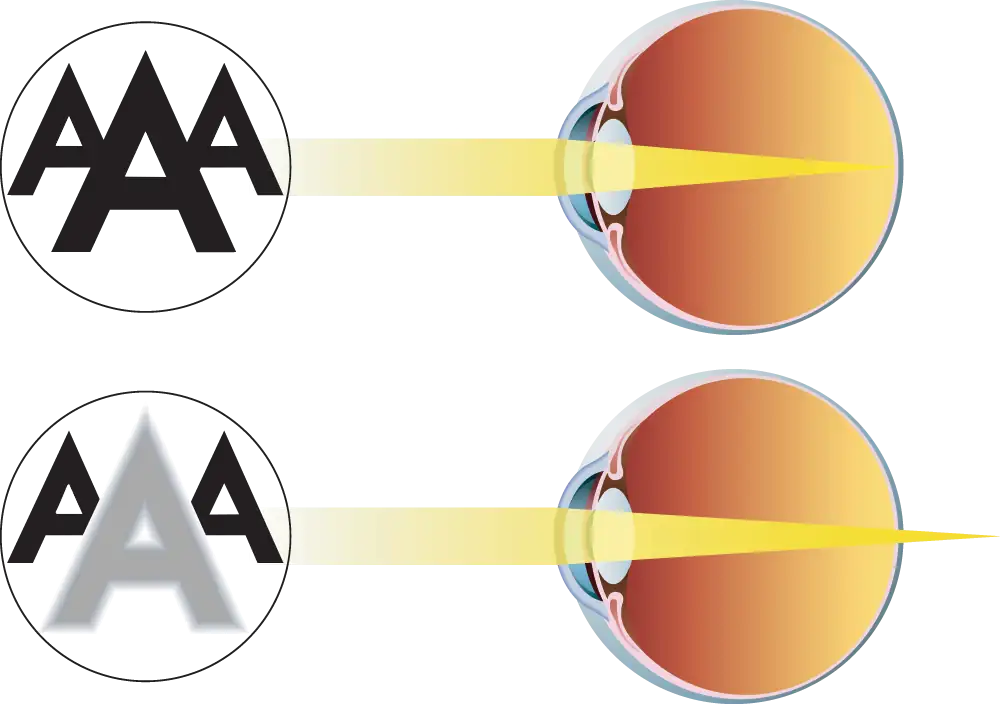Presbyopia
If you are over the age of 40 and have begun to notice that you need to hold menus, books, or your cell phone a bit further away from your face in order to see text, it’s likely you are encountering symptoms of presbyopia. Presbyopia, or age-related near vision loss, can be frustrating, but fortunately for patients in the Chicago and Chicagoland areas, the world-class eye doctors at Kovach Eye Institute offer a range of customized solutions for presbyopia.
What is Presbyopia?
Most people begin to notice signs of presbyopia
Trusted Source
What is Presbyopia?
American Academy of Ophthalmology
Go to Source
in their 40s
. A natural part of the eye’s aging process, presbyopia is a result of the lens of the eye growing increasingly more rigid and less flexible. As a result, light is refracted, or bent, behind the retina. This makes it more difficult to focus on close-up objects. Unlike other refractive errors such as nearsightedness (myopia), farsightedness (hyperopia), and astigmatism, presbyopia or age-related near vision loss is not related to the shape of the eye.

Symptoms of Presbyopia
Presbyopia symptoms may include:
- Blurred vision when reading
- The need to hold reading materials further
from the face to be able to focus - Difficulty reading small print
- Headaches
-
Trusted Source Presbyopia National Eye Institute Go to Source Eye strain
For many people, presbyopia symptoms are worse when they are tired or in low light.
Who Gets Presbyopia?
Everybody gets presbyopia, but certain people may be more likely to notice signs of near vision loss at an earlier age. Premature presbyopia risk factors include:
- Farsightedness (hyperopia)
- Anemia
- Diabetes
- Multiple sclerosis
- Cardiovascular disease
- Certain medications
- A
Trusted Source Presbyopia Mayo Clinic Go to Source previous eye trauma or injury

Treatment for Presbyopia
Presbyopia is universally frustrating, but there is no “one-size-fits-all” solution for age-related near vision loss. At Kovach Eye Institute, we offer a full range of presbyopia treatment options, so we can tailor each patient’s treatment to their unique needs and lifestyles.
Non-Surgical Treatments for Presbyopia
VUITY™ Eye Drops for Presbyopia
VUITY is the first prescription eye drop treatment for presbyopia to be approved by the FDA. VUITY eye drops temporarily reduce or eliminate a patient’s need for reading glasses for up to six hours, but are most effective during the daytime. VUITY contains a medication called pilocarpine that constricts the size of the pupil, making it easier to see up close.
Corrective Eyewear
For patients who aren’t interested in medical or surgical treatment for their presbyopia, corrective eyewear is an effective solution. Patients may choose from bifocals, progressive lenses, or reading glasses, or they may prefer contact lenses. Monovision contact lenses are also an option. These lenses correct one eye for near or intermediate vision, and the other for distance vision.
Vision Correction Surgery for Presbyopia
For patients who desire a permanent solution to their age-related near vision loss, we offer a number of surgical treatments for presbyopia.
Monovision for Presbyopia
Monovision, or blended vision, is a technique where one eye is corrected for near vision and the other eye is corrected for distance vision. The brain adapts to combine the images from both eyes, which allows the patient to enjoy improved vision at a wider range. Our eye doctors can perform LASIK, PRK, or refractive lens exchange with monovision to help our patients with presbyopia and other refractive errors.
Lens Replacement with Premium IOLs
By replacing the natural lens of the eye with an advanced intraocular lens implant (IOL), our eye doctors can permanently treat presbyopia. Lens replacement most frequently happens during cataract surgery, but may also be performed during an identical, elective procedure called refractive lens exchange (RLE) for patients who have not been diagnosed with cataracts.
We offer an array of premium IOL options, including lenses that improve near vision, intermediate vision, distance vision, and any combination of visual ranges. We also offer toric IOLs, which are specifically designed for patients with astigmatism.
Learn More About Premium IOLs

Reviews from Our Patients
Frequently Asked Questions About Presbyopia
If you are over the age of 40 and need to hold reading material at arm’s length in order to focus, it is very likely that you have presbyopia. If this is the case, please see us for an eye exam and discussion of your presbyopia treatment options.
It is true that presbyopia and farsightedness (hyperopia) both affect near vision. However, farsightedness is present at birth and is caused by an improper curvature of the cornea or an eye that is shorter than normal. Presbyopia is acquired, and is caused by aging of the eye’s lens which results in diminished elasticity.
While refractive surgical procedures like SMILE LASIK and PRK can help improve a patient’s distance vision, they cannot prevent the natural aging process that leads to presbyopia. If you are encountering symptoms of presbyopia after having undergone vision correction surgery, we can help you find a treatment that works for you.
Patients with presbyopia will achieved improved vision after monovision LASIK. However, the most effective treatment for many of our patient’s presbyopia needs is refractive lens exchange.
For a short time, you may be able to get by with updating your eyeglass or corrective lenses prescription to improve near vision loss caused by presbyopia. However, the aging process causing the lens of your eye to lose elasticity as you age will continue, so you will still eventually need reading glasses, bifocals, or progressive lenses. The only way to permanently correct presbyopia is replacement of the natural lens of the eye with an IOL during cataract surgery for refractive lens exchange.

Contact Kovach Eye Institute
Are you encountering the frustrating symptoms of presbyopia that make it difficult to see close-up? If you live in Chicago or the Chicagoland area, the experts at Kovach Eye Institute can help you find the best solution for your unique needs. Contact us to learn more during your personalized presbyopia consultation with an experienced eye doctor.
1 American Academy of Ophthalmology. What is Presbyopia? Available: https://www.aao.org/eye-health/diseases/what-is-presbyopia. Accessed January 27, 2023.
2 National Eye Institute. Presbyopia. Available: https://www.nei.nih.gov/learn-about-eye-health/eye-conditions-and-diseases/presbyopia. Accessed January 27, 2023.
3 Mayo Clinic. Presbyopia. Available: https://www.mayoclinic.org/diseases-conditions/presbyopia/symptoms-causes/syc-20363328. Accessed January 27, 2023.
The doctors at Kovach Eye Institute have either authored or reviewed and approved this content.
Page Updated:
